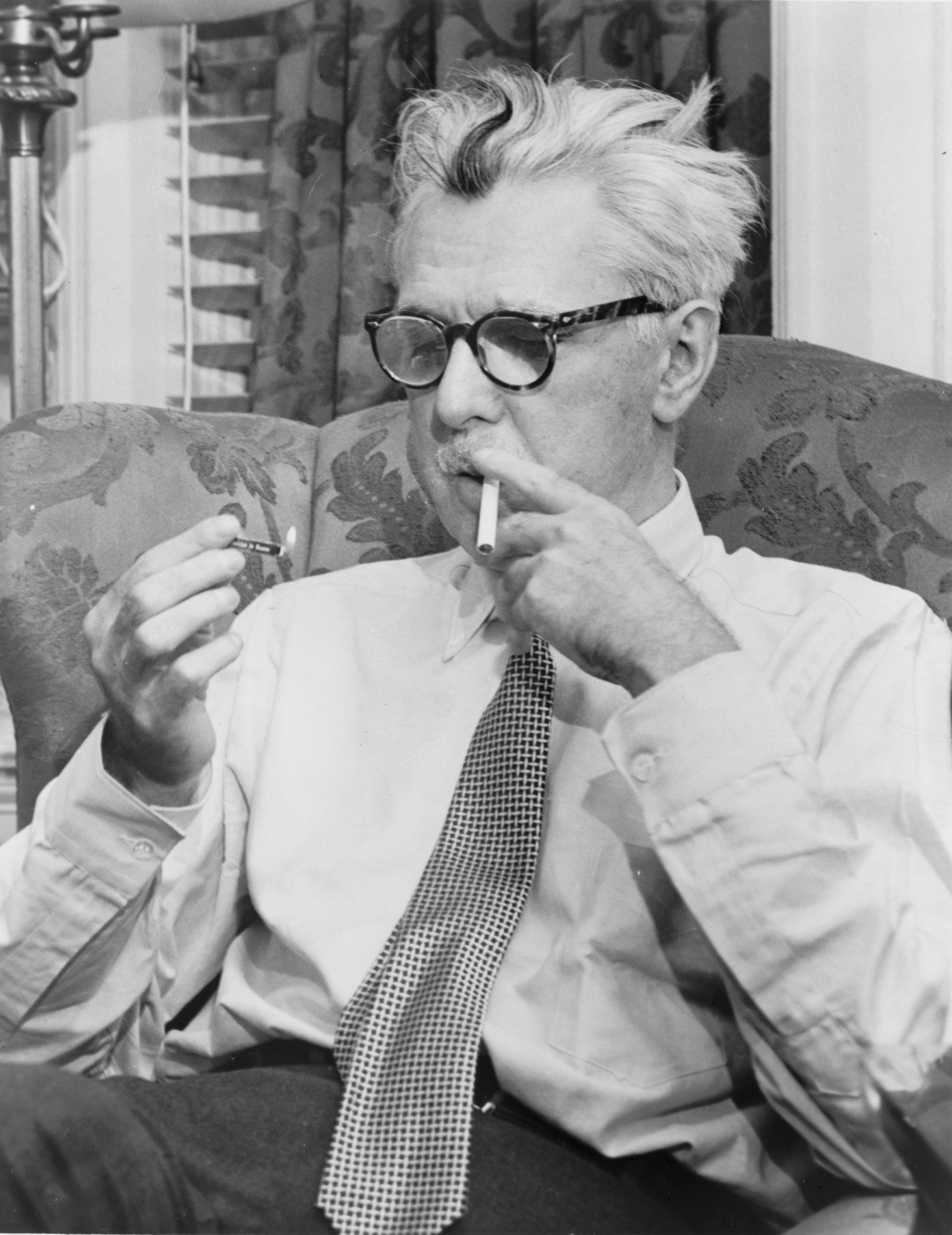“È Meglio conoscere alcune delle domande che tutte le risposte.”
Citato in Focus N.105 pag. 167
James Grover Thurber è stato un giornalista, fumettista, scrittore, novellista e umorista statunitense.
Da molti è conosciuto per la sua attività al New Yorker. Iniziò a lavorare come vignettista nel 1924, all'età di 30 anni, e nel 1933 divenne già caposettore all'interno del New Yorker.
Wikipedia

“È Meglio conoscere alcune delle domande che tutte le risposte.”
Citato in Focus N.105 pag. 167
“Early to rise and early to bed makes a male healthy and wealthy and dead.”
"The Shrike and the Chipmunks", The New Yorker (18 February 1939); Fables for Our Time & Famous Poems Illustrated (1940). Because it is derived from Benjamin Franklin's famous saying this is often misquoted as: Early to rise and early to bed makes a man healthy, wealthy, and dead.
From Fables for Our Time and Further Fables for Our Time
“There is no safety in numbers, or in anything else.”
"The Fairly Intelligent Fly", The New Yorker (4 February 1939), a tale of a fly who avoided getting caught in an empty spider web, but then disregarding a warning by a bee, settled down among other flies he believed to be "dancing", and "became stuck to the flypaper with all the other flies."; Fables for Our Time & Famous Poems Illustrated (1940); Quote Investigator notes that this statement was referred to as "Thurber’s Law", in 1,001 Logical Laws (1979) https://quoteinvestigator.com/2019/07/21/safety/
Ref: en.wikiquote.org - James Thurber / Quotes / Fables for Our Time and Further Fables for Our Time
From Fables for Our Time and Further Fables for Our Time
"The Trouble with Man is Man", The New Yorker; reprinted in Lanterns & Lances (1961).
From Lanterns and Lances
“Nowadays most men lead lives of noisy desperation.”
"The Grizzly and the Gadgets", The New Yorker (date unknown); Further Fables for Our Time (1956); This statement is derived from one of Henry David Thoreau: "The mass of men lead lives of quiet desperation."
From Fables for Our Time and Further Fables for Our Time
“All men kill the thing they hate, too, unless, of course, it kills them first.”
"The Crow and the Scarecrow", The New Yorker (date unknown); Further Fables for Our Time (1956). This is derived from Oscar Wilde's statement "All men kill the thing they love..."
From Fables for Our Time and Further Fables for Our Time
“You mere device," he gnarled. "You platitude! Your Gollux ex machina!”
The 13 Clocks
“You might as well fall flat on your face as lean over too far backward.”
"The Bear Who Let It Alone", The New Yorker (29 April 1939); Fables for Our Time & Famous Poems Illustrated (1940)
From Fables for Our Time and Further Fables for Our Time
"The Duchess and the Bugs", 'Lanterns & Lances (1961).
From Lanterns and Lances
said of the Kennedy-Nixon TV debates in an unpublished manuscript, (dated 20 March 1961); Collecting Himself (1989).
From other writings
Lanterns and Lances (1961), p. 44
From Lanterns and Lances
“The Book-End,” Columbus Dispatch (1923) Collecting Himself (1989).
From other writings
The Secret Life of Walter Mitty (1942)
From other fiction
Memo to The New Yorker (1959); reprinted in New York Times Book Review (4 December 1988)
Letters and interviews
Letter, March 11, 1954, to Malcolm Cowley. Collecting Himself (1989)
Letters and interviews
“A burden in the bush is worth two on your hands.”
"The Hunter and the Elephant", The New Yorker (18 February 1939)
From Fables for Our Time and Further Fables for Our Time
“All right, have it your way — you heard a seal bark!”
Cartoon caption, The New Yorker (30 January 1932); "Women and Men", The Seal in the Bedroom and Other Predicaments (1932); also used in "The Lady on the Bookcase", Alarms and Diversions (1957).
Cartoon captions
Interview, Life Magazine (New York, March 14, 1960).
Letters and interviews
Memo to The New Yorker (1959); reprinted in New York Times Book Review (4 December 1988)
Letters and interviews
Quoted in The New York Times (21 February 1960)
Letters and interviews
Quoted in The Observer (London, 5 February 1961).
Letters and interviews
Memo to The New Yorker (1959); reprinted in New York Times Book Review (4 December 1988)
Letters and interviews
The Years with Ross (Little Brown & Co, 1957, pg.267)
Variant: From one casual of mine he picked this sentence. “After dinner, the men moved into the living room.” I explained to the professor that this was Ross’s way of giving the men time to push back their chairs and stand up. There must, as we know, be a comma after every move, made by men, on this earth.
Memo to The New Yorker (1959); reprinted in New York Times Book Review (4 December 1988); Harold Ross was the editor of The New Yorker from its inception until 1951, and well-known for the overuse of commas
From other writings
“Don't count your boobies until they are hatched.”
"The Unicorn in the Garden", The New Yorker (31 October 1939); Fables for Our Time & Famous Poems Illustrated (1940)
From Fables for Our Time and Further Fables for Our Time
Quoted from an an interview with Glenna Syse in Time Magazine (New York, 15 August 1960); Times editors corrected Thurber's arithmetic
Letters and interviews
"The Case for Comedy", Lanterns & Lances http://books.google.com/books?id=m0RZAAAAYAAJ&q=%22humor+and+pathos+tears+and+laughter+are+in+the+highest+expression+of+human+character+and+achievement+inseparable%22&pg=PA143#v=onepage (1961); previously appeared in The Atlantic Monthly November 1960 http://books.google.com/books?id=6q8GAQAAIAAJ&q=%22and+pathos+tears+and+laughter+are+in+the+highest+expression+of+human+character+and+achievement+inseparable%22&pg=PA98#v=onepage
From Lanterns and Lances
"Foreword", Lanterns & Lances (1961)
From other writings